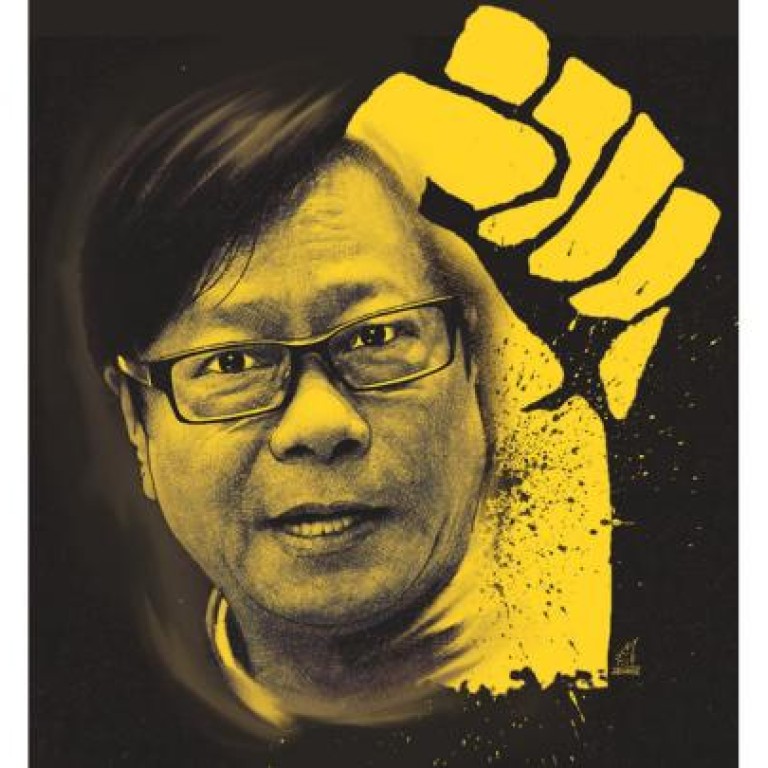
Mister Trouble Wong Yuk-man takes on status quo
Wong Yuk-man's latest showdown, to win a Legco committee seat, has burnished his feisty reputation and fuelled 'infiltrator' suspicions
In all he does, People Power lawmaker Wong Yuk-man stirs controversy. From playing the banana-throwing maverick to masterminding the "de facto referendum" to becoming "Mr filibuster", political journalists have never been short of headlines since he joined the Legislative Council in 2008.
The latest episode to put Wong under the spotlight was yet another internal row within the pan-democratic camp. On Friday, he beat fellow pan-democrat Cyd Ho Sau-lan to grab the seventh and final seat on Legco's Public Accounts Committee, thanks to some help from the pro-establishment camp.
Before the decision, the pan-democratic camp had agreed that Ho would join two other pan-democrats and four pro-government lawmakers on the committee to review government audits. But Wong decided to join the race, setting up a duel between Wong and Ho.
Wong's support from the pro-establishment camp was unusual. Whether they were trying to drive a wedge between two rivals or had some other motive in mind, the move highlighted the reality that the radicals and mainstream pan-democrats are drifting apart.
"The mainstream pan-democrats are too content with their roles as the opposition," Wong said. "It is not possible to fight against the Communist Party if they are satisfied to be just political commentators."
Indeed, as the radicals have grown more powerful over the past year, the two factions have been bickering like a divorced couple. But the damage to mainstream democrats has become so severe that some have begun to question whether Wong could be a mole aiming to undermine their entire movement.
The question is frequently asked in political circles: has the godfather of radicals been made an offer he can't refuse?
Wong rejects speculation that he has cut a deal with the pro-government camp, saying the claim is an effort to discredit him.
"There is no point responding," said Wong, who won 38,578 votes for a second term in last month's Legco election. "The fact is we openly demand the downfall of communist rule in Hong Kong and bear the heaviest attacks from pro-Beijing media."
Wong was moulded as a staunch anti-communist early on. Born in Hong Kong to a landlord family that fled from Guangdong not long after the Communist Party's victory in 1949, Wong was naturally sympathetic to the exiled Nationalists' Kuomintang when he was young.
He later went to study in Taiwan, before returning to Hong Kong to earn a master's degree in history from Chi Hai College, a tertiary institute with a Taiwanese background. He worked as a journalist for several Chinese newspapers in the 1970s, and became a journalism professor in Chi Hai College. He was a member of the KMT for a decade before quitting in protest against the party's Taiwanisation movement in the 1990s.
That change would kick off his political career in Hong Kong. In 1993, Wong joined Albert Cheng King-hon to co-host a talk show that would earn them reputations as two of the city's most effective government critics.
Although he did not start out as a politician, his talent immediately stood out once he jumped into the area. A combination of sublime charisma and fiery temperament, Wong courted controversy wherever he went.
In 2006 he founded the League of Social Democrats with fellow activists "Long Hair" Leung Kwok-hung and lawmaker Albert Chan Wai-yip. He won his Legco seat two years later, on his first attempt.
One of his first acts as legislator was to throw three bananas towards then-chief executive Donald Tsang Yam-kuen during his policy address speech. The radical movement had arrived.
"We are here to struggle against the majority's tyranny," he said. "As the minority party, we have no choice but to challenge the injustice through extraordinary ways. If you do not fight back against the oppression, you will be oppressed even further."
Again and again the radical camp has come up with new ways to push the limits, such as its filibusters and Wong's decision to interrupt his oath earlier this month with strategic coughs.
But his idealism has also caused internal turmoil. Last year he withdrew from the League, citing internal conflicts. He took about 200 members with him and formed People Power. The League has since lost all its seats in the District Council and retained only one in the Legco.
Wong said he believed solidarity could not be built without shared values. His ultimate goal was nothing short of a complete overhaul of the system.
"The society is becoming impatient, with more and more people joining us in the radical movement," Wong said. "The trend is irreversible."
